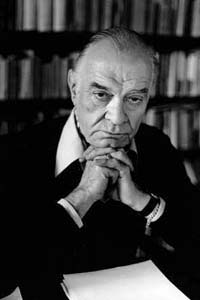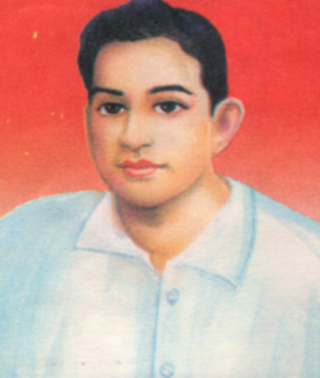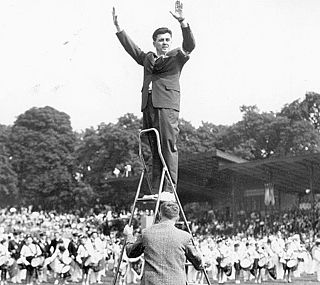Related Research Articles

Pacifism is the opposition or resistance to war, militarism or violence. The word pacifism was coined by the French peace campaigner Émile Arnaud and adopted by other peace activists at the tenth Universal Peace Congress in Glasgow in 1901. A related term is ahimsa, which is a core philosophy in Indian religions such as Hinduism, Buddhism, and Jainism. While modern connotations are recent, having been explicated since the 19th century, ancient references abound.
Anarcho-pacifism, also referred to as anarchist pacifism and pacifist anarchism, is an anarchist school of thought that advocates for the use of peaceful, non-violent forms of resistance in the struggle for social change. Anarcho-pacifism rejects the principle of violence which is seen as a form of power and therefore as contradictory to key anarchist ideals such as the rejection of hierarchy and dominance. Many anarcho-pacifists are also Christian anarchists, who reject war and the use of violence.

Samuel Rutherford Crockett, who published under the name "S. R. Crockett", was a Scottish novelist.
Peacemakers was an American pacifist organization founded following a conference on "More Disciplined and Revolutionary Pacifist Activity" in Chicago in July 1948. Ernest and Marion Bromley and Juanita and Wally Nelson largely organized the group. The name “Peacemakers” was taken from a section of the Bible, the Beatitudes or Sermon on the Mount: "Blessed are the peacemakers, for they will be called children of God." The group’s organizational structure adopted a multidivisional organizational structure with a loose hierarchy, prioritizing local committees including but not limited to the Tax Refusal and Military Draft Refusal Committee. The Peacemakers were social anarchists whose organizational beliefs are largely attributed to Marxist philosophy. Peacemakers aimed to advocate nonviolent resistance in the service of peace.
The philosophy of war is the area of philosophy devoted to examining issues such as the causes of war, the relationship between war and human nature, and the ethics of war. Certain aspects of the philosophy of war overlap with the philosophy of history, political philosophy, international relations and the philosophy of law.

John Michael Hayden is a retired American politician and veteran who served as the 41st governor of Kansas, from 1987 to 1991. He subsequently served as the Secretary of the Kansas Wildlife and Parks Department under Kansas governors Kathleen Sebelius and Mark Parkinson.

Denys Louis de Rougemont, known as Denis de Rougemont, was a Swiss writer and cultural theorist who wrote in French. One of the non-conformists of the 1930s, he addressed the perils of totalitarianism from a Christian point of view. After the Second World War, he promoted European federalism.

Christian pacifism is the theological and ethical position according to which pacifism and non-violence have both a scriptural and rational basis for Christians, and affirms that any form of violence is incompatible with the Christian faith. Christian pacifists state that Jesus himself was a pacifist who taught and practiced pacifism and that his followers must do likewise. Notable Christian pacifists include Martin Luther King Jr., Leo Tolstoy, Adin Ballou, and Ammon Hennacy.

The Five Days of Milan was an insurrection and a major event in the Revolutionary Year of 1848 that started the First Italian War of Independence. On 18 March, a rebellion arose in the city of Milan which in five days of street fighting drove Marshal Radetzky and his Austrian soldiers from the city.
The Anglican Pacifist Fellowship (APF) is a body of people within the Anglican Communion who reject war as a means of solving international disputes, and believe that peace and justice should be sought through nonviolent means.

The sortie on Mestre occurred during the revolutionary year of 1848 on October 27.
Italian volunteers charged the Austrian fortification, took the town and withdrew, with the loot of three baggage-waggons, eight horses, large quantity of ammunition and the military chest, back to the fort at Marghera.

Robert McQueen Grant was an American academic theologian and the Carl Darling Buck Professor Emeritus of Humanities and of New Testament and Early Christianity at the University of Chicago. His scholarly work focused on the New Testament and Early Christianity.

Lucien Le Foyer was a French lawyer, pacifist and politician. He played a leading role in French and international pacifist organizations both before the after World War I (1914–18), and after World War II (1939–45). He was also an accomplished poet.

Chollampel JohnThomas (1918-1960), popularly known by his initials C. J., was an Indian playwright and literary critic of Malayalam literature. He was best known for his plays, Aa Manushyan Nee Thanne, Avan Venndum Varunnu and 1128-il Crime 27 which introduced modernity into Malayalam theatre. He was also a leader of the Vimochana Samaram, an anti-communist uprising against the First E. M. S. Namboodiripad ministry in Kerala.

Rokhl Auerbakh was an Israeli writer, essayist, historian, Holocaust scholar, and Holocaust survivor. She wrote prolifically in both Polish and Yiddish, focusing on prewar Jewish cultural life and postwar Holocaust documentation and witness testimonies. She was one of the three surviving members of the covert Oyneg Shabes group led by Emanuel Ringelblum that chronicled daily life in the Warsaw Ghetto, and she initiated the excavation of the group's buried manuscripts after the war. In Israel, she directed the Department for the Collection of Witness Testimony at Yad Vashem from 1954 to 1968.
William Black Creighton was a Canadian minister, editor, social reformer, and pacifist.
Samuel Frederick Coffman was a Canadian minister, writer and pacifist.
Fred Haslam was a Canadian administrator and pacifist.

Robert Goute was a drum major in the Air de Paris.
Richard Roberts was a Canadian Christian theologian and author expounding the social responsibilities of the Christian conscience. He was “one of the most influential pacifists in Canada during the interwar years”.
References
- 1 2 3 4 5 6 Josephson, Harold (1985). Biographical Dictionary of Modern Peace Leaders . Connecticut: Greenwood. pp. 272-3. ISBN 0-313-22565-6.
- ↑ Fairbairn, Robert (1927). The Appeal to Reality. New York.
{{cite book}}: CS1 maint: location missing publisher (link) - ↑ Socknat, Thomas P. (1981). 'Witness Against War': Pacifism in Canada, 1900-1945 (Thesis). McMaster University.
- ↑ Fairbairn, Robert (1948). Apostate Christendom. London.
{{cite book}}: CS1 maint: location missing publisher (link)